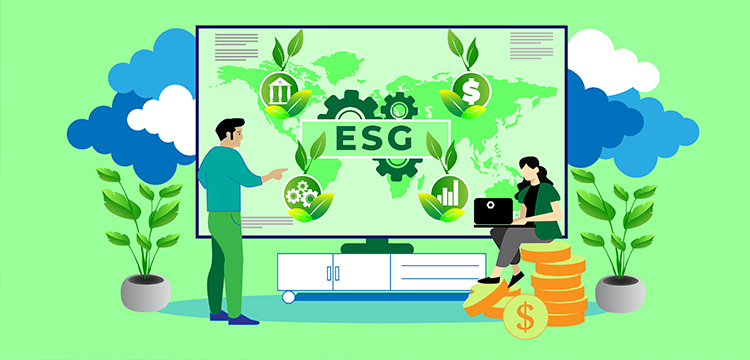Protecting the environment is now such a high business imperative that any organisation that fails to build environmental and sustainability into its corporate strategy and day-to-day operations risks irreversible damage to its profitability. With sustainability performance fast becoming the new barometer to measure overall corporate performance – Environmental, Social and Governance (ESG) is now the number one criterion for measuring future success.
The growing demand for accountability is seeing ESG leap to the top of the corporate agenda, and accountants need to be the driving force in creating an ESG plan that is supported by all levels throughout the organisation – from the CEO, down through middle and lower management, to all employees and stakeholders.
But with many companies struggling with their sustainability transformation, accountants both in business, and in practice, will need to show:
- Where a business or organisation needs to focus its ESG efforts to gain the greatest impact.
- The steps which are needed to put the right transformation engine in place within the business.
- How the journey can be funded.
- What pitfalls and opportunities need to be watched for along the way.
Being an employer of choice
ESG awareness is growing amongst all stakeholders including customers, suppliers, employees, and investors. A company that has good ESG credentials becomes a sought-after employer – an essential requirement particularly for millennial and Generation-Z workers who are quick to leave an organisation if they feel that their values are in conflict with the operation of the business.
Having good ESG credentials also helps businesses to attract top performers and retain its talent. This translates into lower turnover in human capital and helps to ensure that the knowledge that a company has invested in its employees is able to stay within the organisation.
Voice of the consumer
The business world is finding itself under constant pressure from environmentally conscious consumers to be open and honest on the resources that the business exploits or conserves. Not only do they expect companies to manufacturer environmentally friendly products, but consumers are now questioning where companies buy their supplies from, whether their suppliers are treating their people fairly, and are adhering to environmental best practice. As such, consumers have become interested in all the touchpoints in the supply chain, and suppliers across the entire supply chain are finding themselves competing to demonstrate their green credentials to their clients.
Businesses wanting to connect with consumers are faced with the challenge of converting corporate sustainability strategies into clear brand actions capable of closing the value-action gap. This is changing the strategic business-customer relationship creating a deeper customer/business collaboration that generates more stable relationships and increases customer loyalty.
Financial rewards
While some companies are using green innovation to win competitive advantage, increase profitability and improve their brand, companies that waste resources and damage the environment are likely to waste money, alienate their customers, worry investors, and lose market share. Therefore, accountants need to point out to CEOs that investors are now demanding that to get funding organisations must have strong ESG credentials.
For investors it gives greater opportunities for greater financial returns, whilst at the same time avoiding the risks they associate with various environmental, social, and governance issues, such as climate change or poor labour or governance practices. However, as the 'Retail Investor Education in the Context of Sustainable Finance Markets and Products' reportby the Board of the International Organization of Securities Commissions (IOSCO) reveals many investors currently lack a consistent and comparable framework to enable their understanding of sustainable finance products. For many accountants helping companies and clients seek funding – this is a worrying trend.
"Financial education is a key element to enhance investor protection, and it complements the policies, regulations, oversight and enforcement actions that securities regulators may undertake to support the sound and proper development of sustainable finance markets and products," says Ashley Alder, Chair of the IOSCO Board and the Chief Executive Officer of the Hong Kong Securities and Futures Commission. "Financial education also increases investor confidence to participate in innovative financial markets, such as sustainable finance, on a properly informed basis."
"Sustainable finance offers new opportunities for retail investors, locally and globally. But it is crucial that they understand what a sustainable product is, as well as its different opportunities and risks, including the threat of greenwashing," adds Pasquale Munafň, Chairman of the IOSCO Committee on Retail Investors.
A recent survey by Coleman Research into the mergers and acquisitions (M and A) market shows that nearly 68% of financial professionals believe ESG will play an even more important role for their organisation over the next two years, with 77% confirming that ESG will be a significant driver of corporate strategy by 2024.
As accountants continue to become trusted 'go-to' advisers to whom business leaders turn to for assurance that the business is operating in meeting its compliance, regulatory and reporting requirements, accountants will need to drive climate reporting away from being a mere marketing exercise to one that delivers accurate climate related disclosures that show the true impact that a business has on the environment both now, and in the future. Every business now needs to get involved in climate change and do their bit to save the planet. This is not just a moral obligation, but a sound business strategy.
Carol Baker is an author for accountingcpd. To see her latest course, click here.

You need to sign in or register before you can add a contribution.